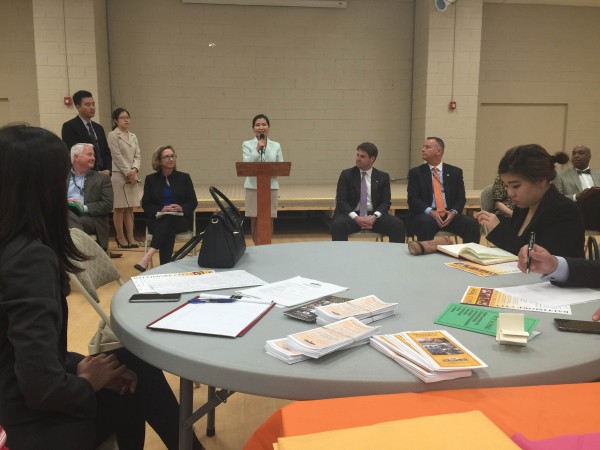Pictured above: Flanked by state and local officials, Maryland First Lady Yumi Hogan addresses a group of Korean small business owners at Gyung Hyang Garden Korean Church on May 5 in Columbia, Md.
by SUEVON LEE | @suevlee
editor@charactermedia.com
Just a few months after her husband, Larry Hogan, assumed the state’s highest office, Maryland’s first lady has helped bridge a cultural divide between state agency representatives and the slew of Korean small business owners affected by the recent riots that engulfed the city of Baltimore.
The South Korean-born Yumi Hogan has been a key presence at several meetings in the riot’s immediate aftermath, addressing business owners in both Korean and English as state officials consider initiatives that will help these individuals get back on their feet.
“It was so surprising and very sad to see years of many generations’ hard work and heartache go down the drain,” Hogan recently told KoreAm through a spokeswoman. “Everything they have worked for was gone in a day. It may be difficult to get back up, but we won’t act in vain. We will work together as a community to get everyone started again.”
Several hundred businesses were looted, damaged or destroyed on April 27, following a funeral held for Freddie Gray, the 25-year-old Baltimore man whose death resulting from a spinal cord injury while in police custody touched off both peaceful demonstrations and destructive rioting that affected many mom-and-pop stores dotting the streets of Baltimore. That same evening, Gov. Hogan signed an executive order declaring a state of emergency and activating the Maryland National Guard to assist Baltimore city police.
More than half of the roughly 250 afflicted businesses were Korean-owned, according to the Korean Society of Maryland (KSM). Damage to these stores has totaled anywhere from a thousand dollars up to $300,000 to $400,000, according to KSM.
“Koreans maintain a large presence in Baltimore and happened to be within areas where the riots occurred,” Hogan said. “There were many other businesses that were affected. It was an unfortunate case, but also very unfortunate for non-Korean business owners.”
The governor’s office is also meeting with Latino, Chinese, Vietnamese and South Asian business owners affected by the riots.
 Members of the Korean small business community attend a meeting with First Lady Yumi Hogan and representatives from state and local agencies on May 5 at Gyung Hyang Garden Korean church in Columbia, Md.
Members of the Korean small business community attend a meeting with First Lady Yumi Hogan and representatives from state and local agencies on May 5 at Gyung Hyang Garden Korean church in Columbia, Md.
Yumi Hogan, a first-generation Korean American painter and first-ever Asian American first lady of Maryland, has addressed the room in at least three meetings held in the last couple of weeks hosted by KSM and the Korean-American Grocers & Licensed Beverage Association of Maryland (KAGRO). These meetings, held in Columbia, Md. and Ellicott City, Md., have supplied English to Korean translations and drawn crowds of Korean business owners seeking assistance from agency services.
In the wake of the riots, the governor’s office recently announced the Maryland Business Recovery Loan program, which would provide loans of up to $35,000 for a one-to-five-year term to be used by affected Baltimore businesses for renovations, repairs and replacing lost inventory.
“This is a good time to engage Korean community members together to strengthen ourselves again and come out of this hardship,” Hogan said. “We needed to get small business owners and Korean community leaderships together and work out a plan as a team; by coming together, we will find support and strength in each other. Our first generations and second generations worked so hard to build a new life, and it was our job to help them.”
Update: This article has been updated to reflect the fact that more than half of the roughly 250 businesses in Baltimore damaged by the recent unrest were Korean-owned.
Recommended Reading
“Keeping Watch All Night” – A firsthand account of a Korean family affected by the Baltimore Riots.
___
All images courtesy of Eun Young Hong







